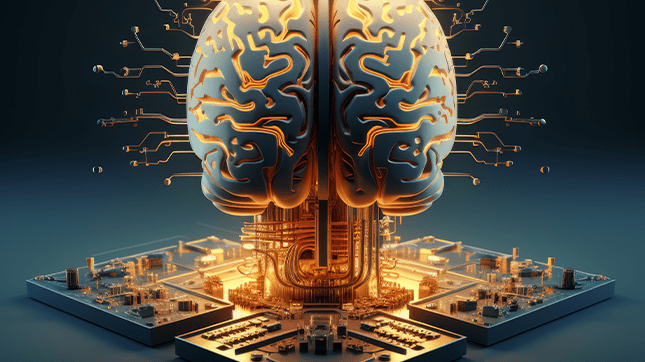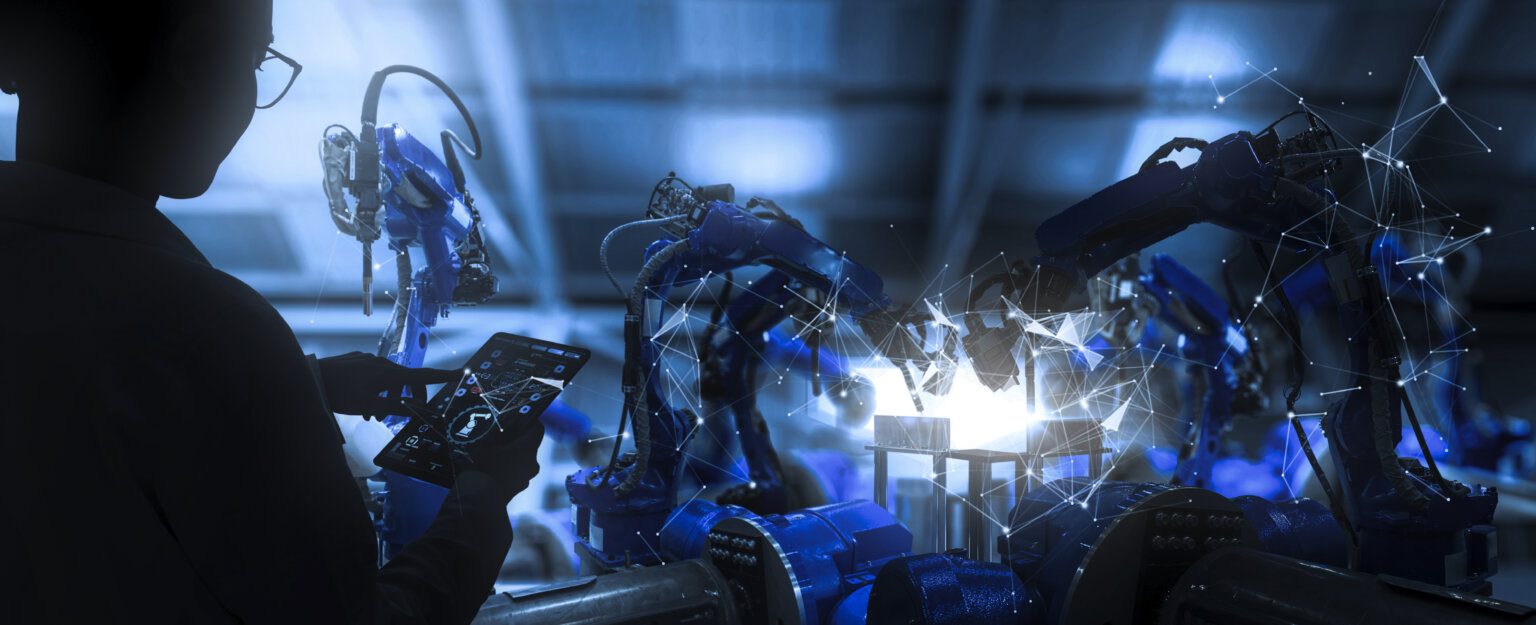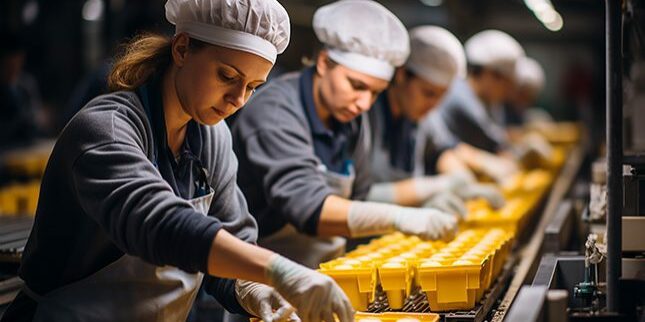AI in production: opportunities & challenges
Artificial intelligence is changing everyday working life for many people. In this article we show the importance for production and present new possibilities.

22. February 2024
Artificial intelligence: it is increasingly finding its way into our everyday lives. It creates new possibilities where humans reach their limits. This opens up unprecedented potential and scope for action for companies too. On the other hand, there are concerns about data protection, changes and the loss of one's own job.
But for manufacturing companies in particular, AI is a serious opportunity to increase efficiency and quality and to be securely positioned for the future. Read the blog post to find out how AI in production increases efficiency and productivity, which challenges you should tackle and overcome and how you can consolidate your position on the market thanks to the technology.
AI in production: typical areas of application
The search for a new cake recipe, working with robots or automated workflows: The use of artificial intelligence differs depending on the area of life. AI also offers numerous areas of application for production, typical examples include
Predictive maintenance
AI in production is often used to analyze processes. The aim is to detect deviations in production systems. If the AI detects such an anomaly, it reports it and thus makes it possible to carry out the necessary maintenance work before the machine breaks down.
Quality assurance
Consistently high-quality products are an essential component for manufacturing companies, and AI can also provide support here: For example, it is able to start analyses based on recorded images of products. Potential for optimization, problems with product quality and even defects can be identified more quickly, reported automatically and subsequently rectified.
Process and logistics data analysis
By collecting large amounts of sensor and machine data and evaluating it quickly and reliably, artificial intelligence is able to take a holistic view of processes. Manufacturing companies therefore use it to efficiently analyze processes and logistics data and to optimize the underlying mechanisms.
Robotics
There is hardly a company in production where there are no repetitive, time-consuming and error-prone processes. AI-controlled robots can be used to automate such processes in many cases and even control machines in some cases.
Forecasting demand and requirements
Reliable planning is essential for the manufacturing industry, especially when it comes to demand and requirements. AI can also help here. Data and factors from the past, such as seasonal production, can be used to identify trends and make predictions. These serve as a basis for companies to plan production quantities and required materials.
Optimizing processes
Process optimization is and remains an essential component of successful companies and can be much more targeted with AI. In production, AI helps companies to analyze their own processes and identify potential for optimization. For example, bottlenecks or opportunities to shorten throughput times become visible.

The most important advantages of AI in production
The benefits that the use of AI in production can generate certainly differ from company to company. Some key ones are:
-
Optimized production and resources
Thanks to AI, both production processes and the utilization of resources can be set up more efficiently. One of the ways in which AI achieves this is by identifying alternative free capacities and resources in the event of bottlenecks. This creates better production conditions as well as the best possible use of resources and therefore more results.
-
Efficient supply chain
Another advantage for production results from AI for companies' supply chains. By monitoring deliveries, stocks and demand, the processing of orders can be optimized. Efficient production makes sensible use of stock levels and reduces costs. This has a positive impact on the entire supply chain.
-
Reduced effort
The tasks are not getting less, time is running out. If people are reaching their time limits, AI can help and reduce the workload. Robots, for example, can be used to outsource monotonous tasks such as assembly and packaging. Cleaning work can also be carried out using robotics and automated tasks can be completed. This leaves you and your employees more time to focus on their actual tasks.
-
Increased safety
There is no question that human labor is essential for successful production. But when it comes to quality control, artificial intelligence can be a great help because it eliminates manual error. A bad day, stress or a brief distraction can quickly cause a distracted eye - absolutely human. But avoidable with AI.
-
Keeping costs low
AI also represents an advantage for production from a cost perspective. The technology organizes storage locations optimally, materials are stored in the best place so that as little as possible is needed. By also avoiding errors, it reduces waste and less material is wasted. All factors that ultimately save money.
-
Avoidance of machine failures
As already described, AI helps to avoid machine failures. The secret lies in the fact that it recognizes deviations from normal processes early on. AI therefore enables maintenance forecasts by means of predictive maintenance. Necessary maintenance measures on the machine can thus be rectified before they become a problem.
The Life Sciences: These are the areas where AI comes into play
The use of artificial intelligence therefore promotes numerous advantages. These are of course also noticeable in the life sciences. More and more companies from the pharmaceutical, biotechnology, chemical, medical technology, cosmetics and food sectors are opting for AI-supported processes and using them in the following areas, for example:
-
Process automation
Whether filling liquids with pipettes, cleaning tasks in the warehouse or repetitive processes in the laboratory: companies in the life sciences can benefit from working with robots. They take over tasks and experiments that occur again and again and slow down the daily work routine. They make monotonous tasks in particular much easier, as the classic human error of carelessness is avoided. Robots can also be used for delicate tasks, for example when handling hazardous substances or food.
-
Early detection of diseases and personalized medicine
Artificial intelligence can also help in the healthcare sector - in two ways. On the one hand, AI is able to evaluate examination results quickly and on a broad data basis. After all, it has access to diagnoses and information that significantly exceed the knowledge and access possibilities of a doctor. This makes it possible to detect serious illnesses earlier, increasing the chances of recovery. On the other hand, AI can also help in the event of illness by creating treatment plans based on a large number of documented experiences and making suggestions for personalized medicine.
-
Machine Learning
Imagine a tool getting better by itself the more tasks it performs. This is exactly what machine learning makes possible: machines are able to learn and improve on their own. This makes work easier, for example in the development of new active ingredients and the efficiency and safety of sensitive processes. These are both factors that play an important role in the life sciences.
Artificial intelligence: these are the challenges and concerns that companies face.
It is clear that the opportunities that AI offers for production are huge. The speed at which artificial intelligence has developed and established itself is at least as impressive. This is precisely what presents companies with challenges and raises concerns.
Data protection
Data protection is one of the biggest issues for companies and is a particularly relevant topic when using AI. This is because it works with huge amounts of data. Companies must ensure that applicable data protection guidelines are adhered to. This is the only way to process sensitive data securely. It is also important to ensure good protection against cyber attacks.
Lack of specialist knowledge and expertise
AI is firmly established in many areas of everyday life. For many companies, however, it is uncharted territory and this means that the necessary specialist knowledge is in short supply. A fact that the manufacturing industry often perceives as a deterrent. The conclusion: before artificial intelligence can be firmly integrated into corporate structures, knowledge and expertise must first be built up.
Resistance to the new
With AI, we are entering a new type of technology, as it is able to develop itself further and become smarter bit by bit. This often raises concerns that our own workforce will no longer be needed. In addition, there are always concerns that artificial intelligence will develop a life of its own. The thought of no longer having any influence over the technology is a driving force. A realistic assessment of the development of work and ensuring cybersecurity therefore play a key role. Education and transparency in processes are essential components for creating a good feeling.
Investment costs and required resources
Another concern that arises time and again in connection with AI: resources of a financial and time-related nature. The introduction of a new technology initially always means expense. However, if a suitable solution is chosen, the investment pays off.
A look into the future: how AI could develop.
As is probably the case with every development, artificial intelligence also brings opportunities and challenges. Concerns such as security and necessary investments are offset by huge potentials such as more results in less time and the reduction of sources of error. This opens up unprecedented opportunities for production. Finally, more products can be manufactured without having to make significant changes. An opportunity that many companies have already discovered for themselves. If you want to be one step ahead of the competition now and stay ahead in the long term, it is a good idea to look into the possibilities of AI. The future is pointing in the direction of robotics, automation and the like, ensuring unprecedented innovations. But how can opportunities and challenges be combined? With a partner at your side who will guide you through the innovations and work with you to develop the right way to use AI in production.
Do you want to move with the future and make sensible use of the potential of artificial intelligence?






